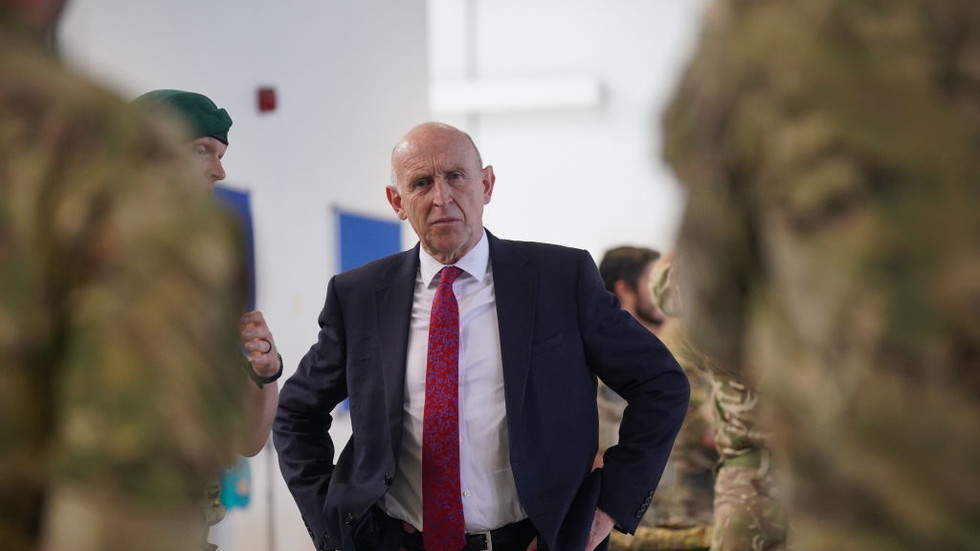British Defense Secretary John Healey has definitively rejected French President Emmanuel Macron’s call for Western nations to halt arms deliveries to Israel. In an interview with Sky News, Healey emphasized that the United Kingdom operates under a distinct system for arms supplies and is not inclined to support Macron’s initiative. The context of this disagreement is underscored by the ongoing conflict in the region, which has heightened following a year marked by violence stemming from the Hamas attacks on southern Israel. The unfolding situation has led to Israel’s military operations in Gaza and increased tensions with its neighboring Muslim countries, who predominantly support Palestine. This regional instability has been compounded by Israel’s recent military actions, including a ground operation in Lebanon and a missile attack from Iran targeting the Jewish state, indicating a broader regional confrontation.
President Macron’s appeal to halt arms supplies is rooted in a plea for a political resolution to the ongoing crises in the Middle East. He highlighted the potential transformation of Lebanon into a conflict zone akin to Gaza if diplomatic measures are not taken. Macron articulated his stance in a recent interview with French media, emphasizing that the international community must reconsider its military support to Israel in light of the prolonged hostilities. The response from Israeli Prime Minister Benjamin Netanyahu was swift and sharp, condemning Macron’s remarks as “disgraceful” and asserting that Israel would prevail regardless of Western backing. Netanyahu’s statements reflect the entrenched positions on both sides, with concerns about international support having significant implications for Israel’s military actions and regional diplomacy.
Healey’s comments about the UK’s arms policy clarify that while the government maintains a level of arms supply to Israel, it is meticulously regulated. After recently suspending 30 out of 350 arms export licenses to Israel—specifically those with the potential to breach international law—Healey underscored the government’s commitment to ensuring that UK supplies do not exacerbate humanitarian crises, particularly in Gaza. He indicated that the suspension was motivated by concerns about how these defense items could be utilized in the conflict, showcasing a careful approach to arms export governance. Despite this, Healey’s assurance that the UK would not implement a full arms embargo signals a commitment to maintaining a strategic partnership with Israel while managing humanitarian concerns.
Yet, Healey did resonate with Macron’s broader call for a political resolution to the Israel-Palestine conflict. He acknowledged the complex nature of diplomacy in this context but emphasized the UK’s determination to lead efforts toward achieving a more stable and peaceful scenario for both Israelis and Palestinians. Healey’s commitment to advocating for a two-state solution represents an important aspect of the UK’s foreign policy ambitions in the region. However, achieving this goal is impeded by longstanding hostilities and a lack of consensus among major stakeholders, which complicates international diplomatic engagements.
The dialogue between Macron and Netanyahu further illustrates the complexities of international relations regarding the Israeli-Palestinian conflict. Their recent phone conversation acknowledged the differences in their perspectives on arms supplies and the underlying causes of regional unrest. While Macron remains firm in his proposition for a halt to arms deliveries, Netanyahu’s expectation is oriented toward unity among Israel’s allies, urging support without limitations that could inadvertently bolster adversaries like Iran. This dynamic underscores the intricate dance of diplomacy that characterizes relationships in the Middle East, where allies may hold differing views on how best to support mutual interests amid escalating hostilities.
In conclusion, the differing stances of France and the UK reflect a broader tension within Western policies toward the Israeli-Palestinian conflict. President Macron advocates for arms embargoes as part of a strategic shift toward a political solution, while Defense Secretary Healey reaffirms the UK’s regulated arms supply and commitment to fostering diplomatic solutions amidst ongoing hostilities. This divergence highlights the challenges faced by Western nations in navigating a path forward that addresses humanitarian concerns while maintaining strategic alliances. As the region grapples with violence and destabilization, the prospect of a political resolution remains uncertain, compounded by conflicting views among allies and the persistent need for a sustainable peace process.

